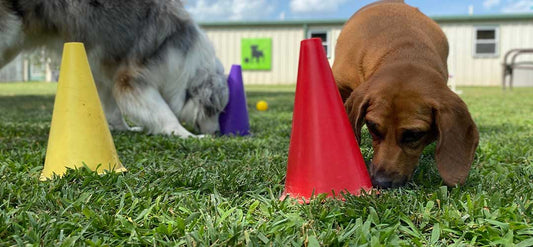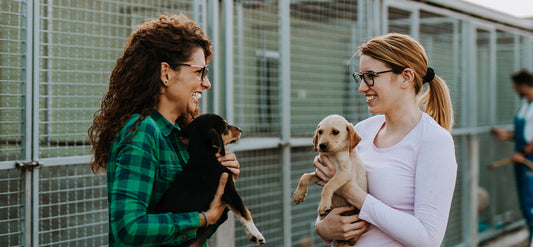At Muenster, our slogan is “More Love in Every Bag.” And we mean it! We want your dog to get all the benefits from the food you’ve purchased from us. Proper dog food storage is one way that you as a pet parent can ensure your dog is getting the nutritional benefits that you purchased. Safe food storage is pretty straight-forward and by following a just a few tips, you play a vital role in your pet’s health.
Pet Food Location, Location, Location
One of the advantages of dry pet food or kibble is that it’s relatively easy to store. It doesn’t need to be kept cold, and it has a relatively long shelf life. However, there are a few things to avoid:
-
Don’t store the food in direct sunlight. Sunlight can cause the food to lose its nutrients and flavor.
-
Don’t store the food in a humid environment. Moisture can cause the food to spoil.
-
Don’t store the food where it’s too warm. Ideally, keep food inside your home in pantry or cupboard, but avoid an area that’s near heat or humidity like the store, oven or dishwasher.
-
Don’t store the food in a place where pests can get to it. Pests, such as mice, ants and weevils, can contaminate the food and make it unsafe for your dog to eat.
Bag or Container?
Actually, either will work providing you’re keeping the elements out. Carefully rolling the bag closed and using a chip clip or close pin works. Transferring the kibble into a designated glass or plastic bin is also fine. Bins can be more airtight and have nice features like locking lids, pouring spouts, or wheels. Just make sure that you wash the container with warm, soapy water between bags, and hold on to the original packaging that the food came in.
Why Keep the Packaging?
While utilizing food storage containers isn’t a bad idea, do not throw away the food’s original packaging until it’s all gone. The bag or box that the food came in will have important information, like the UPC code, lot number, expiration date, list of ingredients, etc.
Having this info on hand (along with your receipt) will make it much easier to return the food if you experience quality or contamination issues with it. If your pet starts showing symptoms of food allergies or an upset stomach after eating, perusing their food’s ingredient list can help pinpoint the offending substance. If there is a recall due to a health or safety hazard, you’ll want to know the food’s lot number to determine whether or not the bag you bought is included.
Are Expiration Dates for Real?
Yes, they actually are. It’s not a good idea to feed your pet expired food. Once the “best by” date passes, we can no longer guarantee the food’s quality. At best, it may have lost some of its nutritional value, and your pet might find the taste or texture unpleasant. At worst, though, the preservatives in the food may no longer be able to keep harmful bacteria at bay, and your pet could be in for an upset stomach—or a trip to the vet. So keep an eye on those expiration dates, and discard any food that’s past its prime.
One of the best things you can do for your pet’s health and safety is to inspect their food before you give it to them. No, you don’t need to examine every individual kibble with a magnifying glass. But do give it a quick once-over to make sure that the color, texture, and smell of the food is normal, and it’s not contaminated with bugs or foreign materials (like metal shards or flakes of plastic). Remember: our pets often can’t tell when something is amiss with their meal. For that reason, it’s critical for us to be careful for them!



